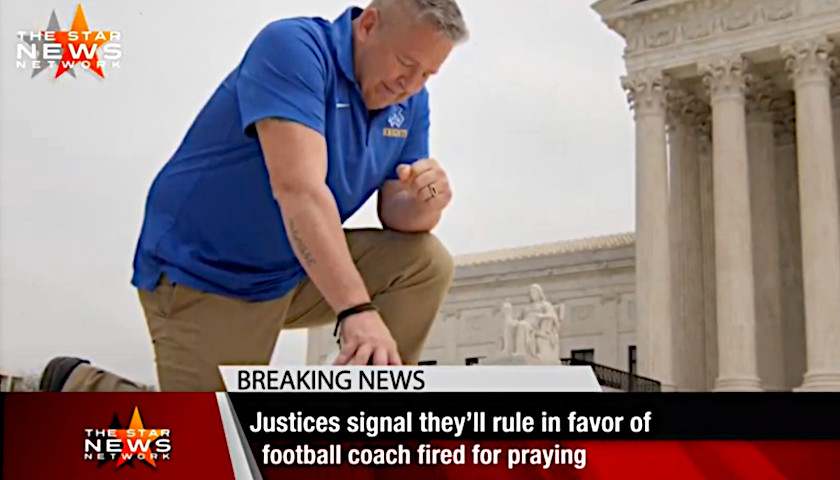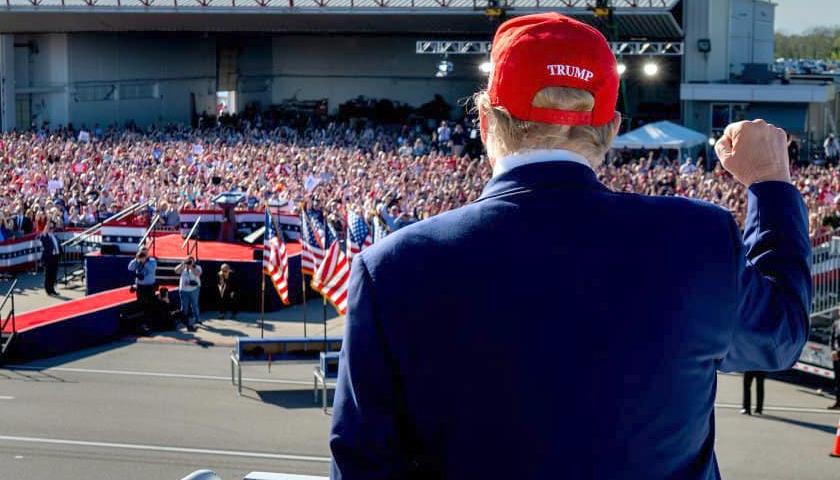Neil W. McCabe, the national political editor of The Star News Network, covered the oral arguments heard on April 25, 2022, by Supreme Court justices in the Kennedy v. Bremerton School District case.
Joe Kennedy was an assistant football coach at Bremerton High School and that Washington State school district fired Kennedy because he continued to pray on the football field and he allowed others, such as players to join him.
The school district said the Marine combat veteran’s actions were an endorsement of religious activities forbidden by the Constitution’s Establishment Clause.
Kennedy’s attorney, First Liberty’s Paul Clement, told the justices that the only offense that triggered the coach’s dismissal seven years ago was that he prayed on the football field.
Clement said that even young students understand that just because religious speech takes place inside the school’s gates, it does not mean that the government has endorsed the religious speech or that it is the establishment of a state religion.
Clement, a man who has made more than 100 arguments before the high court, told the justices, Kennedy’s prayers after the game, when the players were heading off the field, did not establish a government compelled religious activity but were his private and protected devotion.
Michael Berry, the general counsel for First Liberty and a member of Kennedy’s legal team, told The Star News Network questions by justices Clarence Thomas and Brett Kavanaugh, signaled that the Supreme Court was reluctant to further restrict religious rights as a consequence of the case.
‘If the coach, instead of taking a knee for prayer, took a knee during the National Anthem because of moral opposition to racism, how would your school district respond? Would that be government speech?’ Thomas asked.
‘How far hard does that go? A coach does the sign of the cross right before the game,’ Kavanaugh asked.
‘I think both of those questions, the one from Justice Thomas and the one from Justice Kavanaugh show that the court wants to issue a ruling that is going to protect free speech,’ Berry said. ‘It’s going to protect religious freedom. They just want to figure out where they should draw that line.’
The hurdle for the Bremerton School District was that the coach was never accused of coercion before he was fired, yet it was the centerpiece of their arguments.
‘It seemed from the argument, opposing counsel wanted the case to be about something entirely different than it’s actually about,’ Berry said.
Supreme Court bar member, George Braun told The Star News Network that as he kept score, it looked good for the coach.
‘I believe that coach Kennedy will be coaching football again next fall, and from what I understand, the team could really use him.’
TRANSCRIPT
McCabe: Marine combat veteran Joe Kennedy was fired from his job as an assistant football coach after he continued to prey on the football field and allow the players to join him. Today, the Supreme Court justices heard oral arguments in his lawsuit, Kennedy v. Bremerton School District.
Kennedy was represented by First Liberty attorney Paul Clement, a man who has made more than 100 arguments before the high court. Clement told the justices Kennedy’s prayers after the game when the players were heading off the field, did not establish a government compelled religious activity, but were his private and protected devotion.
Clement: As much as the district would like to change the subject, the record is clear that Coach Kennedy was fired for that midfield prayer and is simple enough for even young students to understand that the government does not endorse all private religious speech just because it takes place on the school side of the gates.
McCabe: Michael Barry, a member of the First Liberty legal team, told The Star News Network. Questions by Justices Clarence Thomas and Brett Kavanaugh signaled that the Supreme Court was reluctant to further restrict religious rights as a consequence of the case.
Thomas: If the coach, instead of taking a knee for prayer, took a knee during the national anthem because of moral opposition to racism, how would your school district respond? Would that be government speech?
Kavanaugh: How far does that go if the Coach does the sign of the cross right before the game?
Berry: I think both of those questions, the one from Justice Thomas and the one from Justice Kavanaugh, show that the court wants to issue a ruling that is going to protect free speech. It’s going to protect religious freedom. They just want to figure out where they should draw that line.
McCabe: The hurdle for the Bremerton School District was that the coach was never accused of coercion before he was fired, yet it was the centerpiece of their arguments.
Berry: It seemed like from the argument, opposing counsel wanted the case to be about something entirely different than it’s actually about.
McCabe: Supreme Court bar member George Braun told The Star News Network as he kept score, it looked good for the coach.
Braun: I believe that Coach Kennedy will be coaching football again next fall, and from what I understand, the team could really use him.
McCabe: Reporting for The Star News Network Neil W. McCabe, Washington.






If the coach wants to pray in a PRIVATE place, that’s his business. If he does it PUBLICLY, then he should be very careful not to come across as forcing his own religious views on others who may either have a different religion or no religion at all. In other words, the coach as an authority figure, must not either unwittingly or wittingly impose his or her private religious view on others or intimidate others. Most fundamentalists have more in common with the Taliban than they do with genuine Americanism.
Man, you are comparing a Christian to terrorists who kill women and who hate everyone. You are a piece of work who believes that liberals know all.